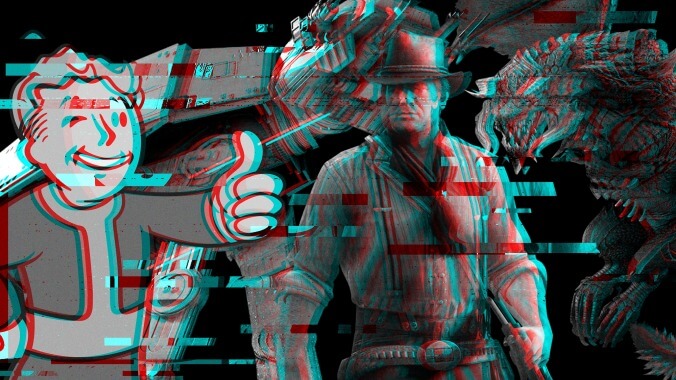The evolution of online gaming threatens extinction for the disconnected life
Image: Graphic: Allison Corr
There’s something to be said about the sheer amount of effort it takes to get a crap ton of people together just to play a game. Back before online multiplayer games achieved a stranglehold on the industry, you used to have to physically gather your buddies to play through a multiplayer campaign, and wouldn’t leave the room until a clear victor had been determined. Take, for instance, Star Wars’ Battlefront II (the 2005 version): It was a near-perfect take on multiplayer shooter action in the Star Wars universe, complete with a variety of maps and playable characters that you could use to wreak havoc on your friends. And if you were so inclined, you could even play online if your pals were too busy. Its online features were straightforward, easy to access, and arguably the biggest draw to the series, even as it provided a stellar example of couch-based competition, too.
So you can only imagine that same generation of players being psyched to see this beloved franchise be rebooted 10 years later. But that enthusiasm lasted only until the reboot itself arrived: On paper, EA Games successfully rebooted the Star Wars first-person shooter in 2015, taking the online community for a spin. But there was a darkness lurking at this new game’s core. Before its release, micro-transactions, loot boxes, and expansion packs were mere supplements to online multiplayer games, not necessary requirements to finishing the game, or win a campaign. EA’s Battlefront reboot was a literal game-changer, essentially selling a version of its Battlefield series of online shooters disguised as a revamped Star Wars game. Like Battlefield, the 2015 Battlefront was less a full game and more a template for other (paid) parts to be bolted on to, and it all but forced players to buy add-ons and special expansion packs to “enhance” the overall experience—up to requiring the purchase of season passes in order to access the online multiplayer community at all.
But despite the resistance from nostalgia-fueled Battlefront stans, the game took off. Its smooth controls, modern graphics, and life-like maps afforded it a success akin to that of its sister games over in the Battlefield franchise, and re-launched the series back into relevance—while also codifying its “additions” to the online multiplayer playbook as acceptable, if irritating, practices.
The push toward piecemeal, always-online experiences that Battlefront II came to stand at the apex of had been brewing for years, though, and was initially met with a lot of opposition from the moderate gaming community. But it swiftly became the norm for almost every online game, shooter and RPG alike. Its rise spurred the ongoing joke that purchasing any game with online features was the equivalent of buying a cheeseburger—but with the patty and cheese part of a completely separate transaction. Within these newer online communities, these pay-to-play arrangements became an ever-more-acceptable norm. You pay to upgrade your character, your items, and ultimately you pay for a “premium” experience—despite having often already paid to purchase the game in the first place. Before the “innovations” of the past decade, online console gaming was simple: You’d play the main story mode offline, and could often even play a multiplayer story without connection. While online, meanwhile, you’d join a server to play a completely separate campaign. The line between online and offline was clear, and the traditional gaming experience had no real dependency on its online counterpart.
That changed in 2013, when Rockstar blessed us with Grand Theft Auto V, simultaneously introducing an online community that would define GTA for the next six years. Unlike the beta online server for Red Dead Redemption—the company’s first real step into the multiplayer action-RPG universe—GTA V introduced a separate online story mode (simply dubbed Grand Theft Auto Online) that was a player’s gateway into extending the overall experience indefinitely.
 Keep scrolling for more great stories.
Keep scrolling for more great stories.
